Refine search
Actions for selected content:
23990 results in Ancient history
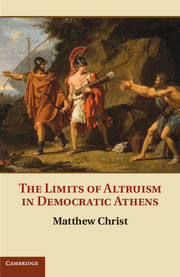
The Limits of Altruism in Democratic Athens
-
- Published online:
- 05 November 2012
- Print publication:
- 08 October 2012
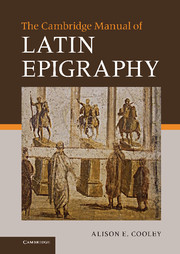
The Cambridge Manual of Latin Epigraphy
-
- Published online:
- 05 November 2012
- Print publication:
- 13 September 2012
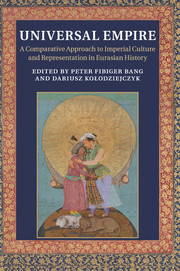
Universal Empire
- A Comparative Approach to Imperial Culture and Representation in Eurasian History
-
- Published online:
- 05 November 2012
- Print publication:
- 16 August 2012
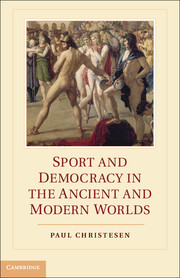
Sport and Democracy in the Ancient and Modern Worlds
-
- Published online:
- 05 November 2012
- Print publication:
- 15 October 2012
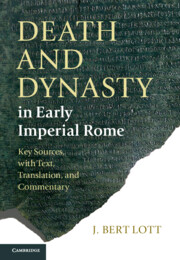
Death and Dynasty in Early Imperial Rome
- Key Sources, with Text, Translation, and Commentary
-
- Published online:
- 05 November 2012
- Print publication:
- 30 August 2012
Chapter 4 - Friendship and the grave:
-
- Book:
- Reading Roman Friendship
- Published online:
- 05 February 2013
- Print publication:
- 18 October 2012, pp 259-354
-
- Chapter
- Export citation
Chapter 1 - Men and women
-
- Book:
- Reading Roman Friendship
- Published online:
- 05 February 2013
- Print publication:
- 18 October 2012, pp 63-115
-
- Chapter
- Export citation
Works cited
-
- Book:
- Reading Roman Friendship
- Published online:
- 05 February 2013
- Print publication:
- 18 October 2012, pp 355-373
-
- Chapter
- Export citation
Chapter 2 - Love and friendship:
-
- Book:
- Reading Roman Friendship
- Published online:
- 05 February 2013
- Print publication:
- 18 October 2012, pp 116-173
-
- Chapter
- Export citation
General index
-
- Book:
- Reading Roman Friendship
- Published online:
- 05 February 2013
- Print publication:
- 18 October 2012, pp 377-378
-
- Chapter
- Export citation
Introduction
-
- Book:
- Reading Roman Friendship
- Published online:
- 05 February 2013
- Print publication:
- 18 October 2012, pp 1-62
-
- Chapter
- Export citation
Copyright page
-
- Book:
- Reading Roman Friendship
- Published online:
- 05 February 2013
- Print publication:
- 18 October 2012, pp iv-iv
-
- Chapter
- Export citation
Contents
-
- Book:
- Reading Roman Friendship
- Published online:
- 05 February 2013
- Print publication:
- 18 October 2012, pp v-v
-
- Chapter
- Export citation
Reading Roman Friendship - Half title page
-
- Book:
- Reading Roman Friendship
- Published online:
- 05 February 2013
- Print publication:
- 18 October 2012, pp i-ii
-
- Chapter
- Export citation
Abbreviations
-
- Book:
- Reading Roman Friendship
- Published online:
- 05 February 2013
- Print publication:
- 18 October 2012, pp ix-x
-
- Chapter
- Export citation
Reading Roman Friendship - Title page
-
-
- Book:
- Reading Roman Friendship
- Published online:
- 05 February 2013
- Print publication:
- 18 October 2012, pp iii-iii
-
- Chapter
- Export citation
Index of passages discussed
-
- Book:
- Reading Roman Friendship
- Published online:
- 05 February 2013
- Print publication:
- 18 October 2012, pp 374-376
-
- Chapter
- Export citation
Illustrations
-
- Book:
- Reading Roman Friendship
- Published online:
- 05 February 2013
- Print publication:
- 18 October 2012, pp vi-vii
-
- Chapter
- Export citation
Chapter 3 - Love and friendship:
-
- Book:
- Reading Roman Friendship
- Published online:
- 05 February 2013
- Print publication:
- 18 October 2012, pp 174-258
-
- Chapter
- Export citation
Acknowledgments
-
- Book:
- Reading Roman Friendship
- Published online:
- 05 February 2013
- Print publication:
- 18 October 2012, pp viii-viii
-
- Chapter
- Export citation
